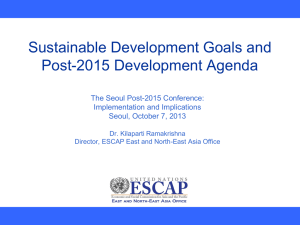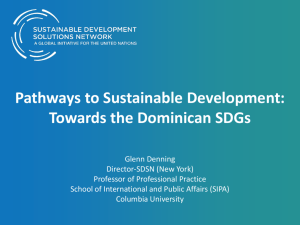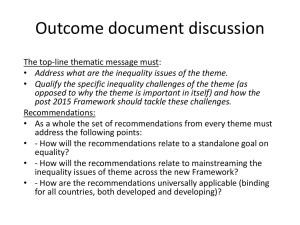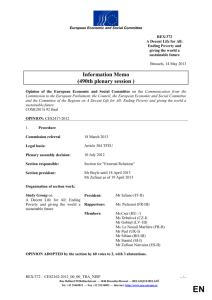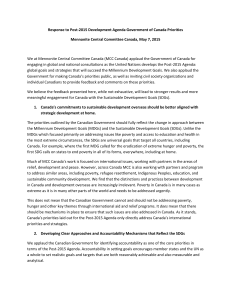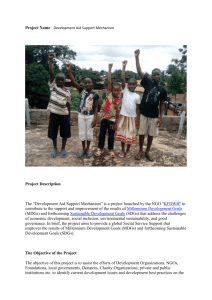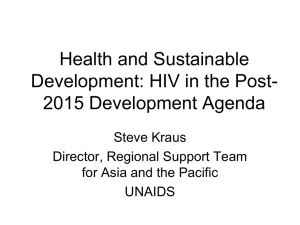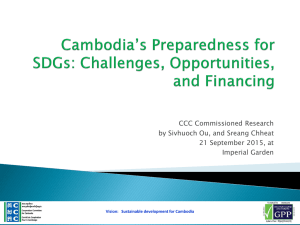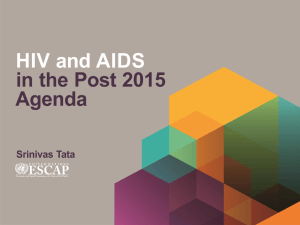Regional Workshop on Sustainable Development Goals: Priorities and Solutions
advertisement
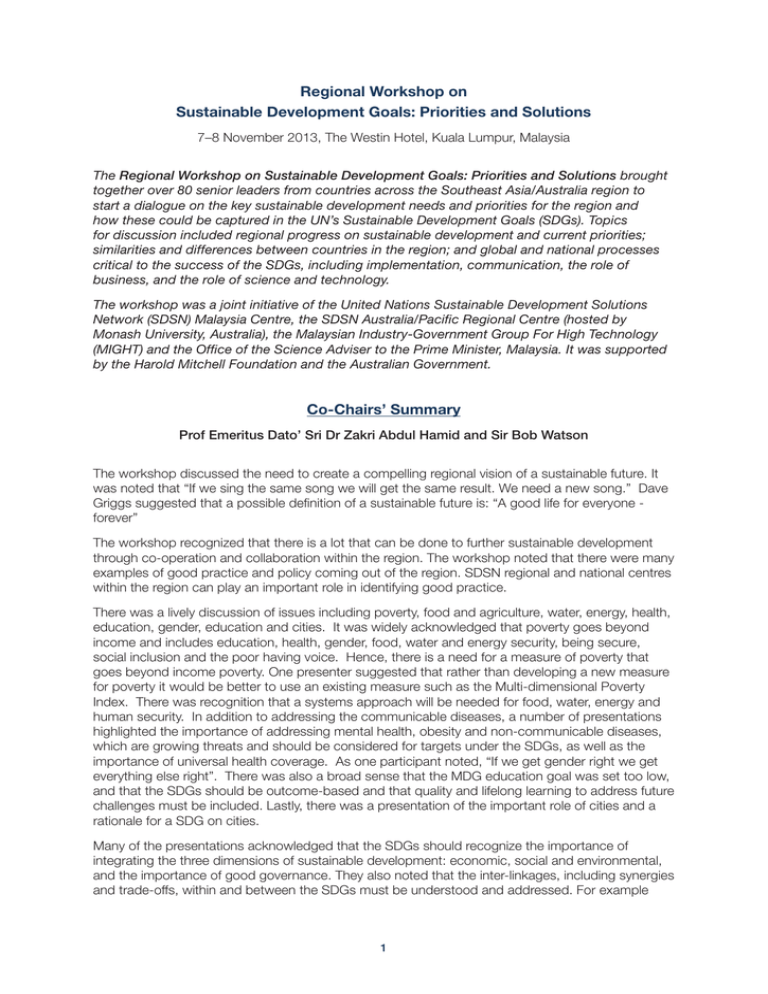
Regional Workshop on Sustainable Development Goals: Priorities and Solutions 7–8 November 2013, The Westin Hotel, Kuala Lumpur, Malaysia The Regional Workshop on Sustainable Development Goals: Priorities and Solutions brought together over 80 senior leaders from countries across the Southeast Asia/Australia region to start a dialogue on the key sustainable development needs and priorities for the region and how these could be captured in the UN’s Sustainable Development Goals (SDGs). Topics for discussion included regional progress on sustainable development and current priorities; similarities and differences between countries in the region; and global and national processes critical to the success of the SDGs, including implementation, communication, the role of business, and the role of science and technology. The workshop was a joint initiative of the United Nations Sustainable Development Solutions Network (SDSN) Malaysia Centre, the SDSN Australia/Pacific Regional Centre (hosted by Monash University, Australia), the Malaysian Industry-Government Group For High Technology (MIGHT) and the Office of the Science Adviser to the Prime Minister, Malaysia. It was supported by the Harold Mitchell Foundation and the Australian Government. Co-Chairs’ Summary Prof Emeritus Dato’ Sri Dr Zakri Abdul Hamid and Sir Bob Watson The workshop discussed the need to create a compelling regional vision of a sustainable future. It was noted that “If we sing the same song we will get the same result. We need a new song.” Dave Griggs suggested that a possible definition of a sustainable future is: “A good life for everyone forever” The workshop recognized that there is a lot that can be done to further sustainable development through co-operation and collaboration within the region. The workshop noted that there were many examples of good practice and policy coming out of the region. SDSN regional and national centres within the region can play an important role in identifying good practice. There was a lively discussion of issues including poverty, food and agriculture, water, energy, health, education, gender, education and cities. It was widely acknowledged that poverty goes beyond income and includes education, health, gender, food, water and energy security, being secure, social inclusion and the poor having voice. Hence, there is a need for a measure of poverty that goes beyond income poverty. One presenter suggested that rather than developing a new measure for poverty it would be better to use an existing measure such as the Multi-dimensional Poverty Index. There was recognition that a systems approach will be needed for food, water, energy and human security. In addition to addressing the communicable diseases, a number of presentations highlighted the importance of addressing mental health, obesity and non-communicable diseases, which are growing threats and should be considered for targets under the SDGs, as well as the importance of universal health coverage. As one participant noted, “If we get gender right we get everything else right”. There was also a broad sense that the MDG education goal was set too low, and that the SDGs should be outcome-based and that quality and lifelong learning to address future challenges must be included. Lastly, there was a presentation of the important role of cities and a rationale for a SDG on cities. Many of the presentations acknowledged that the SDGs should recognize the importance of integrating the three dimensions of sustainable development: economic, social and environmental, and the importance of good governance. They also noted that the inter-linkages, including synergies and trade-offs, within and between the SDGs must be understood and addressed. For example 1 understanding the inter-linkages between energy, water and food security are critical. When implementing SDGs at the national level one size does not fit all and national circumstances must be taken into account. The workshop heard some very interesting presentations from a national perspective. It was noted that while policies and plans are often in place at the national level, the breakdown often comes in lack of implementation, in part due to a lack of data and knowledge. Hence, the workshop stressed the importance of interdisciplinary Science, Technology and Innovation to sustainable development. The workshop also pointed out the strong links between investment in R&D and business success. One presentation outlined the critical role Future Earth could play in providing knowledge required to underpin the transformation to a sustainable world. Existing and new appropriate technologies will play an important role in achieving a sustainable future. Issues and perceptions associated with technologies such as nuclear energy, GM crops and nanotechnology were discussed. Key challenges that will need to be addressed include Common But Differentiated Responsibilities, financing, debt relief, subsidies, technology transfer, intellectual property rights, trade reform, capacity building and going beyond the classic measure of economic growth, i.e., Gross National Product (GNP). The workshop discussed the need to complement GDP by the five forms of capital, (natural, built, social, human and financial) as they are a much better indicator of whether the growth is sustainable. The workshop acknowledged that to transition to a sustainable world will require a wide range of stakeholders to play a critical role. Governments at all levels, national, regional and local have the responsibility to set the framework to achieve sustainable development. But equally important to achieving the SDGs will be the business sector, who must be involved from the start and throughout the process. The issue of financing will be key to implementing the SDGs. The meeting noted that there are huge pools of savings, for example in superannuation funds, available to be invested but stability of regulation and reliability of government are required to release this investment. The meeting also noted that youth should be more involved in the discussions given it is their generation that will be responsible for implementing the SDGs. Media is one of the most powerful forces in the world today and the digital age is revolutionizing how we communicate. Hence the media, including social media, will have a critical role to play in ensuring society and all relevant stakeholders are aware of the SDGS and in implementing them. While the discussion on the SDGs was broadly consistent with the general direction being taken by the UN OWG, there was concern about process – in particular it was viewed that there needs to be greater engagement of business, youth and the community in developing the goals and targets. Key achievements: 1. Established a regional network of experts and key stakeholders in various fields relevant to sustainable development from Southeast Asia and Australia. 2. High level of enthusiasm throughout the region to engage in the SDGs process. 3. Agreed to ongoing collaboration between the SDSN national and regional centres: Southeast Asia, Indonesia, Malaysia and Australia. 4. Agreed to a workshop in Indonesia in 2014 after the Presidential election but before the inauguration. 5. Discussed a number of key themes and processes that should be considered as part of the development of the SDGs 2
